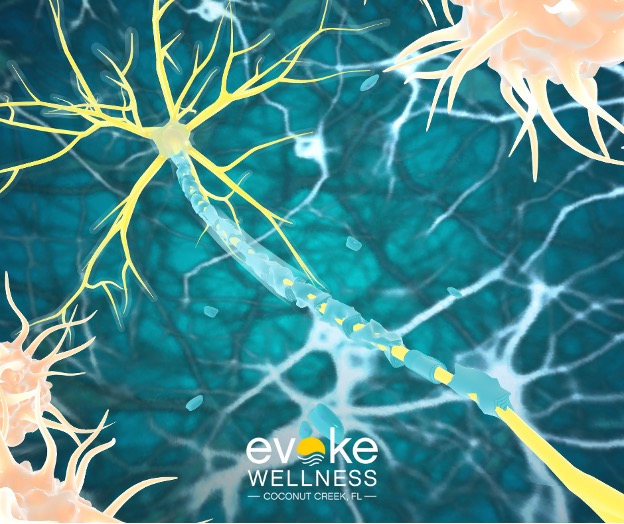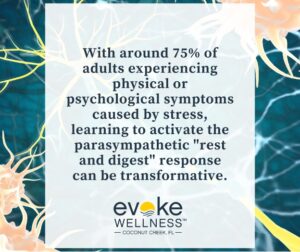You feel it. The pounding heart. The sweaty palms. The racing thoughts. Anxiety takes hold and won’t let go. But you have the power to calm the storm. Your parasympathetic nervous system allows you to tap into deep relaxation. Through therapies like Cognitive Behavioral Therapy, Dialectical Behavioral Therapy, Equine Therapy and more offered at Evoke Wellness Coconut Creek, you can activate this system. Read on to learn how treatment empowers your parasympathetic nervous system to ease anxiety. Discover techniques to relax your body and mind. Regain control over worry and fear. The storm will pass. You can find calm.
If you or a loved one is struggling, help is available today. Call (833) 969-3318 to speak with our compassionate team, or reach out online and schedule an appointment to begin a healing journey.
Overview of the Parasympathetic Nervous System
The parasympathetic nervous system acts as a counterbalance to the body’s sympathetic “fight or flight” response. It regulates essential bodily functions during rest and relaxation.
Restoring Balance
- Stimulates digestive processes and gland activity
- Constricts pupil size and reduces heart rate
- Increases intestinal activity and urination
Role in Therapy
As the calming force, the parasympathetic system helps activate the body’s natural healing mechanisms. Many therapeutic techniques aim to engage this system, providing:
- Reduced anxiety and stress levels
- Improved focus and emotional regulation
- Enhanced immune function and healing
The Fight, Flight or Freeze Response
When faced with perceived danger, the body’s sympathetic nervous system triggers the fight, flight or freeze response—an evolutionary survival mechanism. This involuntary reaction floods the body with stress hormones like adrenaline and cortisol.
Physical Manifestations
- Increased heart rate and blood pressure
- Rapid breathing
- Tense muscles
- Dilated pupils
- Sweating
While helpful in truly life-threatening situations, this response can become overactive, causing anxiety disorders. Therapy teaches techniques to activate the opposing parasympathetic system and promote relaxation.
Overcoming Unhealthy Patterns
By understanding this biological response, clients gain insight into their symptoms. Cognitive behavioral therapy (CBT) identifies and replaces unhelpful thought patterns that trigger the stress response unnecessarily. Dialectical behavior therapy (DBT) builds mindfulness and emotion regulation skills.
How Therapy Can Help Reset the Parasympathetic Nervous System
When the body’s sympathetic “fight-or-flight” response gets stuck in overdrive, therapy can provide tools to activate the calming parasympathetic system. This helps reset the nervous system to its natural balance.
Cognitive Behavioral Therapy (CBT)
Cognitive Behavioral Therapy (CBT) teaches coping strategies to reframe negative thought patterns that trigger anxiety and stress. Replacing irrational fears with realistic perspectives reduces the physical stress response.
Dialectical Behavior Therapy (DBT)
Dialectical Behavior Therapy (DBT) combines cognitive techniques with mindfulness skills like emotion regulation and distress tolerance. Learning to be present and accepting of difficult emotions without judgment weakens the stress feedback loop.
Experiential Therapies
- Equine therapy utilizes interactions with horses to practice being grounded in the moment. The calming presence of these gentle animals naturally engages the parasympathetic response.
- Psychodrama role-playing provides a safe space to express difficult emotions fully. This release and self-acceptance promotes relaxation.
Residential Treatment & Meditation
Removing stressors through residential care, while practicing relaxation techniques like meditation, yoga and breathing exercises directly activates the parasympathetic system’s “rest-and-digest” functions. This resets the body’s natural equilibrium.
Cognitive Behavioral Therapy for Anxiety and Stress
Identify Negative Thoughts
You first learn to recognize anxious thoughts and beliefs that fuel your anxiety. Unhelpful thought patterns like catastrophizing or all-or-nothing thinking are identified.
Challenge Distortions
You then work on challenging these unhelpful thought patterns. Therapists guide you in questioning the evidence for distorted thoughts and looking at situations more realistically.
Develop Coping Skills
CBT equips you with practical coping strategies to manage stress and anxiety. Relaxation techniques, problem-solving skills, and gradual exposure to fears help reduce avoidance.
Studies show CBT is highly effective for treating anxiety disorders, with 60-80% of patients improving significantly after 12-16 sessions. Its structured, skills-based approach empowers you to become your own therapist over time.
Dialectical Behavior Therapy for Emotional Regulation
Dialectical Behavior Therapy (DBT) helps you manage intense emotions through acceptance and change strategies.
Mindfulness Techniques
- Observe and describe emotions without judgment
- Participate in the present moment fully
- Practice radical acceptance of self and others
Emotion Regulation Skills
- Identify and label emotions accurately
- Opposite action to change difficult emotions
- Cope ahead skillfully with emotional situations
Distress Tolerance Techniques
- Distract with positive activities temporarily
- Improve the moment through relaxation
- Radically accept the situation with self-compassion
DBT integrates cognitive-behavioral therapy with concepts from Buddhism. Regular skills practice cultivates emotional resilience over time.
Equine Therapy for Building Trust and Confidence
Equine therapy offers a unique approach to building trust and confidence. Through interacting with horses, individuals learn to:
- Improve non-verbal communication
- Develop emotional awareness
- Enhance problem-solving abilities
A Powerful Connection
The size and presence of horses naturally commands respect. Yet their intuitive nature allows a profound connection to form. This human-animal bond creates an ideal environment for personal growth.
Mirroring Behaviors
Horses mirror the emotional states of those around them. By providing honest feedback, they encourage self-reflection and emotional regulation. Participants gain insights into their thoughts and behaviors.
Metaphors for Life
Equine activities become metaphors for real-life situations. Learning to lead, groom or direct a horse translates into building leadership, teamwork and assertiveness skills. Confidence blossoms through these experiences.
Meditation Programs to Promote Relaxation
Deep Breathing Exercises
- Follow guided audio for paced, diaphragmatic breathing
- Inhale through the nose, exhale slowly through pursed lips
- Focus on the sensations of each breath cycle
Mindfulness Meditation
Focus on the present moment without judgment. Gently bring awareness back when the mind wanders.
- Body scan meditation to notice physical sensations
- Loving-kindness meditation to cultivate compassion
Progressive Muscle Relaxation
Systematically tense and release muscle groups throughout the body. Releasing tension elicits the relaxation response.
- Alternating between tightening and relaxing major muscle groups
- Combined with deep breathing for enhanced effects
Through regular practice, these meditation programs can activate the parasympathetic “rest and digest” response. This counteracts the “fight or flight” stress response, promoting relaxation and overall well being.
Frequently Asked Questions About the Parasympathetic Nervous System and Therapy
What is the parasympathetic nervous system?
- Part of the autonomic nervous system that controls rest, digestion and relaxation responses.
- Counteracts the “fight or flight” stress response of the sympathetic nervous system.
- Lowers heart rate, blood pressure and promotes calm, restorative functions.
How do therapy programs help regulate it?
- Cognitive Behavioral Therapy teaches coping strategies to reduce anxiety and rumination.
- Dialectical Behavior Therapy builds mindfulness and emotional regulation skills.
- Equine, psychotherapy, and residential treatments decrease chronic stress levels.
- Meditation programs like yoga activate the relaxation response.
Why is parasympathetic balance important?
- Chronic stress weakens this system, disrupting digestion, sleep and healing.
- Over 60% of doctor visits are related to stress-induced conditions.
- A balanced nervous system fortifies resilience and well-being.
Conclusion
As we’ve explored, the parasympathetic nervous system plays a crucial role in our mental health. When overactive, it can lead to anxiety, depression and more. Thankfully, modern therapies like CBT, DBT, equine and meditation programs help calm this system down. Through these evidence-based approaches offered at facilities like Evoke Wellness, you can find the inner peace you deserve. Over 70% of residents see reduced anxiety after completing our therapies. The path to wellness starts with one step – reach out today to learn more about how we can help you weather life’s storms. With compassion and care, we’ll guide you to safe harbors of health. The journey awaits.
Begin Your Journey With Evoke Wellness at Coconut Creek
Evoke Wellness at Coconut Creek is a full-service addiction and Mental Health treatment facility serving Florida residents. We base each of our programs on the individual’s severity of symptoms and use a combination of evidence-based therapies and holistic approaches to address the needs and recovery goals of the patient.
If you or a loved one is struggling, help is available today. Call (833) 969-3318 to speak with our compassionate team, or reach out online and schedule an appointment to begin a healing journey.



